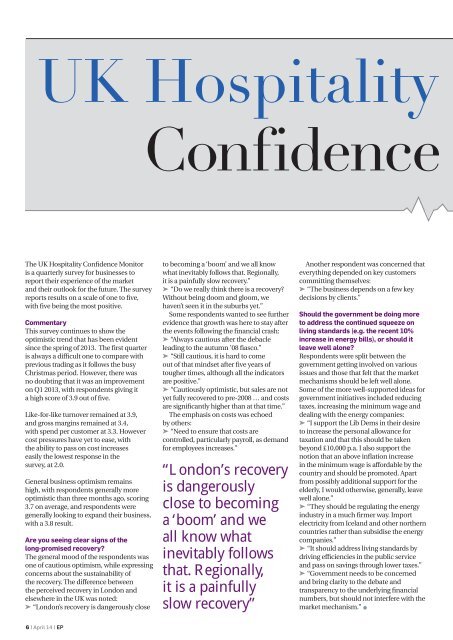EP Business in Hospitality Issue 49 - April 2014
EP magazine provides a reference point for executives on topical issues which may impact business growth, industry structure, professional and skill development, and broader economic and political changes. The magazine reports on all sectors of the industry, including hotels, restaurants, events and foodservice (contract catering).
EP magazine provides a reference point for executives on topical issues which may impact business growth, industry structure, professional and skill development, and broader economic and political changes. The magazine reports on all sectors of the industry, including hotels, restaurants, events and foodservice (contract catering).
You also want an ePaper? Increase the reach of your titles
YUMPU automatically turns print PDFs into web optimized ePapers that Google loves.
UK <strong>Hospitality</strong><br />
Confidence<br />
The UK <strong>Hospitality</strong> Confidence Monitor<br />
is a quarterly survey for bus<strong>in</strong>esses to<br />
report their experience of the market<br />
and their outlook for the future. The survey<br />
reports results on a scale of one to five,<br />
with five be<strong>in</strong>g the most positive.<br />
Commentary<br />
This survey cont<strong>in</strong>ues to show the<br />
optimistic trend that has been evident<br />
s<strong>in</strong>ce the spr<strong>in</strong>g of 2013. The first quarter<br />
is always a difficult one to compare with<br />
previous trad<strong>in</strong>g as it follows the busy<br />
Christmas period. However, there was<br />
no doubt<strong>in</strong>g that it was an improvement<br />
on Q1 2013, with respondents giv<strong>in</strong>g it<br />
a high score of 3.9 out of five.<br />
Like-for-like turnover rema<strong>in</strong>ed at 3.9,<br />
and gross marg<strong>in</strong>s rema<strong>in</strong>ed at 3.4,<br />
with spend per customer at 3.3. However<br />
cost pressures have yet to ease, with<br />
the ability to pass on cost <strong>in</strong>creases<br />
easily the lowest response <strong>in</strong> the<br />
survey, at 2.0.<br />
General bus<strong>in</strong>ess optimism rema<strong>in</strong>s<br />
high, with respondents generally more<br />
optimistic than three months ago, scor<strong>in</strong>g<br />
3.7 on average, and respondents were<br />
generally look<strong>in</strong>g to expand their bus<strong>in</strong>ess,<br />
with a 3.8 result.<br />
Are you see<strong>in</strong>g clear signs of the<br />
long-promised recovery?<br />
The general mood of the respondents was<br />
one of cautious optimism, while express<strong>in</strong>g<br />
concerns about the susta<strong>in</strong>ability of<br />
the recovery. The difference between<br />
the perceived recovery <strong>in</strong> London and<br />
elsewhere <strong>in</strong> the UK was noted:<br />
“London’s recovery is dangerously close<br />
to becom<strong>in</strong>g a ‘boom’ and we all know<br />
what <strong>in</strong>evitably follows that. Regionally,<br />
it is a pa<strong>in</strong>fully slow recovery.”<br />
“Do we really th<strong>in</strong>k there is a recovery?<br />
Without be<strong>in</strong>g doom and gloom, we<br />
haven’t seen it <strong>in</strong> the suburbs yet.”<br />
Some respondents wanted to see further<br />
evidence that growth was here to stay after<br />
the events follow<strong>in</strong>g the f<strong>in</strong>ancial crash:<br />
“Always cautious after the debacle<br />
lead<strong>in</strong>g to the autumn ’08 fiasco.”<br />
“Still cautious, it is hard to come<br />
out of that m<strong>in</strong>dset after five years of<br />
tougher times, although all the <strong>in</strong>dicators<br />
are positive.”<br />
“Cautiously optimistic, but sales are not<br />
yet fully recovered to pre-2008 … and costs<br />
are significantly higher than at that time.”<br />
The emphasis on costs was echoed<br />
by others:<br />
“Need to ensure that costs are<br />
controlled, particularly payroll, as demand<br />
for employees <strong>in</strong>creases.”<br />
“London’s recovery<br />
is dangerously<br />
close to becom<strong>in</strong>g<br />
a ‘boom’ and we<br />
all know what<br />
<strong>in</strong>evitably follows<br />
that. Regionally,<br />
it is a pa<strong>in</strong>fully<br />
slow recovery”<br />
Another respondent was concerned that<br />
everyth<strong>in</strong>g depended on key customers<br />
committ<strong>in</strong>g themselves:<br />
“The bus<strong>in</strong>ess depends on a few key<br />
decisions by clients.”<br />
Should the government be do<strong>in</strong>g more<br />
to address the cont<strong>in</strong>ued squeeze on<br />
liv<strong>in</strong>g standards (e.g. the recent 10%<br />
<strong>in</strong>crease <strong>in</strong> energy bills), or should it<br />
leave well alone?<br />
Respondents were split between the<br />
government gett<strong>in</strong>g <strong>in</strong>volved on various<br />
issues and those that felt that the market<br />
mechanisms should be left well alone.<br />
Some of the more well-supported ideas for<br />
government <strong>in</strong>itiatives <strong>in</strong>cluded reduc<strong>in</strong>g<br />
taxes, <strong>in</strong>creas<strong>in</strong>g the m<strong>in</strong>imum wage and<br />
deal<strong>in</strong>g with the energy companies:<br />
“I support the Lib Dems <strong>in</strong> their desire<br />
to <strong>in</strong>crease the personal allowance for<br />
taxation and that this should be taken<br />
beyond £10,000 p.a. I also support the<br />
notion that an above <strong>in</strong>flation <strong>in</strong>crease<br />
<strong>in</strong> the m<strong>in</strong>imum wage is affordable by the<br />
country and should be promoted. Apart<br />
from possibly additional support for the<br />
elderly, I would otherwise, generally, leave<br />
well alone.”<br />
“They should be regulat<strong>in</strong>g the energy<br />
<strong>in</strong>dustry <strong>in</strong> a much firmer way. Import<br />
electricity from Iceland and other northern<br />
countries rather than subsidise the energy<br />
companies.”<br />
“It should address liv<strong>in</strong>g standards by<br />
driv<strong>in</strong>g efficiencies <strong>in</strong> the public service<br />
and pass on sav<strong>in</strong>gs through lower taxes.”<br />
“Government needs to be concerned<br />
and br<strong>in</strong>g clarity to the debate and<br />
transparency to the underly<strong>in</strong>g f<strong>in</strong>ancial<br />
numbers, but should not <strong>in</strong>terfere with the<br />
market mechanism.” <br />
6 | <strong>April</strong> 14 | <strong>EP</strong>

















